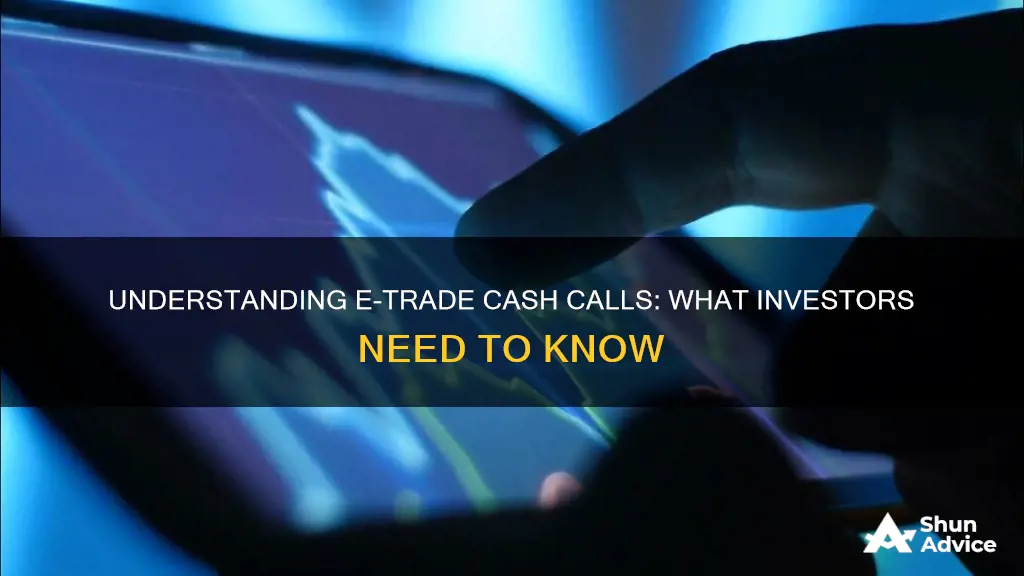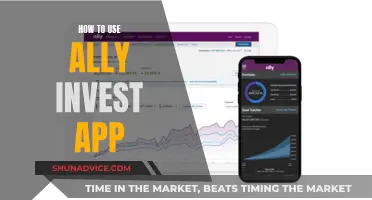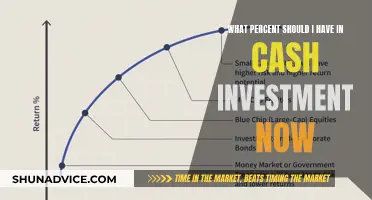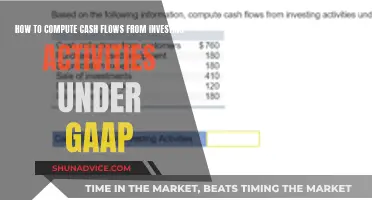
A cash call on E*TRADE is a notification sent to brokerage account holders to address a negative balance in their accounts. This could be due to executed orders exceeding the account's cash balance, or administrative fees surpassing the account's funds. When an investor needs to increase the cash balance in their brokerage account, a cash call is issued, which is typically because the cash balance has fallen below the required minimum. This can be due to accrued charges or trading activities. For example, if an investor buys securities without sufficient cash in their account to cover the purchase, a cash call is issued to bring the account balance up to the required level.
| Characteristics | Values |
|---|---|
| Definition | A cash call on E*TRADE is a notification sent to brokerage account holders requiring them to address a negative balance in their accounts. |
| Causes | Executed orders that exceed the account's cash balance, administrative fees surpassing the account's funds, OTC and similar fees, stock depreciation on margin. |
| Responses | Deposit additional funds, sell stock, transfer shares. |
| Consequences of non-compliance | Forced sale of securities at potentially unfavourable prices, interest or commission charges, negative impact on the account holder's financial standing and investment strategy. |
| Comparison with margin call | A cash call is about maintaining a minimum cash balance in the account, while a margin call relates to borrowing funds to buy securities and the subsequent valuation of these securities. |
What You'll Learn
- A cash call is a notification requiring action on negative account balances
- A cash call can be triggered by executed orders exceeding the account's cash balance
- OTC and other fees can cause a negative balance, triggering a cash call
- Administrative fees may also cause a negative balance and subsequent cash call
- A cash call can be addressed by depositing additional funds to cover the deficit

A cash call is a notification requiring action on negative account balances
A cash call is a notification sent to E*TRADE brokerage account holders requiring them to address a negative balance in their accounts. This balance could result from various activities, including executed orders that exceed the account's cash balance or administrative fees surpassing the account's funds.
Causes of Cash Calls on E*TRADE
Negative balances that trigger a cash call can be caused by several activities. These include:
- Exceeding Account Balance: When an order is executed that exceeds the available balance in a cash account, it triggers a cash call.
- OTC & Similar Fees: ETRADE can charge fees for buying over-the-counter (OTC) stocks or reorganisations, which can turn your account negative and cause a cash call.
- Administrative Fees: If administrative fees are greater than the available balance, it results in a negative account balance, leading to a cash call.
- Stock Depreciation on Margin: For accounts operating on margin, a depreciation in stock value can create a scenario where the account is borrowing cash to maintain portfolio positions, necessitating a cash call.
Responding to a Cash Call
To satisfy a cash call, E*TRADE account holders have several options:
- Deposit Additional Funds: Injecting more cash into the account to cover the deficit.
- Sell Stock: Liquidating assets to raise the necessary funds.
- Transfer Shares: Moving shares from other accounts or portfolios to balance the negative amount.
Consequences of Not Meeting a Cash Call
Failing to meet a cash call can lead to significant consequences, including the forced sale of securities at potentially unfavourable prices. E*TRADE, like other brokerage firms, has specific policies on handling unmet cash calls, which could affect the account holder's financial standing and investment strategy. You may also be charged interest or commissions if they deem necessary.
Cash App Investment Options: Where to Put Your Money
You may want to see also

A cash call can be triggered by executed orders exceeding the account's cash balance
A cash call is a notification sent to brokerage account holders requiring them to address a negative balance in their accounts. This can be caused by executed orders that exceed the account's cash balance, or administrative fees surpassing the account's funds.
When an order is executed that exceeds the available balance in a cash account, it triggers a cash call. This can occur when an investor buys securities without sufficient cash in the account to cover the purchase. A cash call is then issued to bring the account balance up to the required level.
A cash account is one where all stock purchases must be paid in full on or before the settlement date. The settlement period is the time between the trade date (when the transaction occurs) and the settlement date (when payment is made and ownership of the securities is transferred).
In general, stocks settle on the trade date plus one business day (T+1). However, banking holidays are non-settlement days, and while you can trade on these days, they are not included in the settlement period.
It is important to note that selling stock short and selling uncovered options are not permitted in cash accounts. The buying power in a cash account is the maximum dollar amount available for placing trades. Settled funds, unsettled funds-available, and unsettled funds-unavailable are used to determine a cash account's buying power.
To avoid a negative balance and a subsequent cash call, investors should ensure they have sufficient settled cash in their accounts before placing trades.
Understanding Cash Flow: Investing Activities Explained
You may want to see also

OTC and other fees can cause a negative balance, triggering a cash call
A cash call is a notification sent to brokerage account holders requiring them to address a negative balance in their accounts. This can be caused by various activities, including executed orders that exceed the account's cash balance or administrative fees that surpass the account's funds.
One such fee is the OTC fee, which is charged when buying over-the-counter (OTC) stocks or during reorganizations. These fees can cause an account to go into negative territory and trigger a cash call. For example, E*TRADE charges a fee of around $7 per OTC transaction, and these fees are taken directly from the account's balance. If an account holder racks up enough of these fees, it can result in a negative balance and a subsequent cash call.
Other fees and charges can also contribute to a negative balance and a cash call. For instance, administrative fees, such as those for account maintenance or wire transfers, can be deducted from an account's balance. If these fees exceed the available funds, it will result in a negative balance. Additionally, for accounts operating on margin, a depreciation in stock value can lead to a scenario where the account needs to borrow cash to maintain portfolio positions, again triggering a cash call.
It's important to note that failing to meet a cash call can lead to significant consequences. E*TRADE and other brokerage firms have specific policies in place to deal with unmet cash calls, which could negatively impact the account holder's financial standing and investment strategy. Therefore, it is crucial for account holders to monitor their balances and ensure they have sufficient funds to cover any fees or charges that may arise.
Cashing Out Investments: Using the Cash App to Withdraw Funds
You may want to see also

Administrative fees may also cause a negative balance and subsequent cash call
A cash call is a notification sent to brokerage account holders requiring them to address a negative balance in their accounts. This can be caused by various activities, including executed orders that exceed the account's cash balance or administrative fees surpassing the account's funds.
Administrative fees are charged by E*TRADE for certain transactions, such as buying over-the-counter (OTC) stocks or reorganizations. These fees can accumulate over time and, if they surpass the available balance in an account, can result in a negative balance. For example, E*TRADE charges a $38 fee for reorganization, and this can quickly add up if there are multiple reorganizations.
When administrative fees exceed the account's funds, it results in a negative account balance, triggering a cash call. This means that the investor needs to take immediate action to increase the cash balance in their brokerage account. Failure to meet a cash call can lead to significant consequences, including the forced sale of securities at potentially unfavorable prices, affecting the account holder's financial standing and investment strategy.
To avoid administrative fees causing a negative balance and subsequent cash call, investors should carefully review the fee structure of their brokerage account and ensure they understand the fees associated with different transactions. Additionally, regularly monitoring their account balance and ensuring sufficient funds are available can help prevent a negative balance situation.
It is also important to note that cash calls are different from margin calls. While both situations require the account holder to add funds to their account, they arise under different circumstances and have distinct implications. A margin call occurs when an investor borrows funds from the broker to purchase stocks, and the value of those stocks decreases below a certain threshold.
Uncertain Future Cash Flows: Navigating Investment Project Analysis
You may want to see also

A cash call can be addressed by depositing additional funds to cover the deficit
A cash call is a notification sent to E*TRADE brokerage account holders requiring them to address a negative balance in their accounts. This can be addressed by depositing additional funds to cover the deficit. A cash call can be triggered by a variety of activities, including executed orders that exceed the account's cash balance or administrative fees that surpass the account's funds. For example, E*TRADE can charge fees for buying over-the-counter (OTC) stocks or reorganisations, which can turn an account negative and trigger a cash call.
Administrative fees can also result in a cash call. If these fees are greater than the available balance, the account goes into negative balance, and a cash call is issued. A cash call can also be triggered by stock depreciation on margin. If the value of stocks purchased with borrowed money decreases below a certain threshold, the account is borrowing cash to maintain portfolio positions, necessitating a cash call.
Cash Investment Strategies: Your Guide to Profitable Opportunities
You may want to see also
Frequently asked questions
A cash call on E*TRADE is a notification sent to brokerage account holders to address a negative balance in their accounts. This could be due to executed orders exceeding the account's cash balance or administrative fees surpassing the account's funds.
A cash call is triggered when an order is executed that exceeds the available balance in a cash account. OTC and similar fees, such as those for buying OTC stocks or reorganizations, can also cause a cash call. Administrative fees may also trigger a cash call if they surpass the account's available balance.
Failing to meet a cash call can lead to significant consequences, including the forced sale of securities at potentially unfavorable prices. E*TRADE may also charge interest or commissions. It is important to understand and adhere to E*TRADE's policies on handling unmet cash calls to maintain your financial standing and investment strategy.
To satisfy a cash call, E*TRADE account holders have several options: depositing additional funds to cover the deficit, selling stock to liquidate assets and raise funds, or transferring shares from other accounts or portfolios to balance the negative amount.
While both situations require the account holder to add funds to their account, they differ in their circumstances and implications. A cash call is about maintaining a minimum cash balance in the account, while a margin call relates to borrowing funds to buy securities and the subsequent valuation of these securities. Cash calls can occur in any brokerage account, whereas margin calls are specific to margin accounts involving borrowing.







